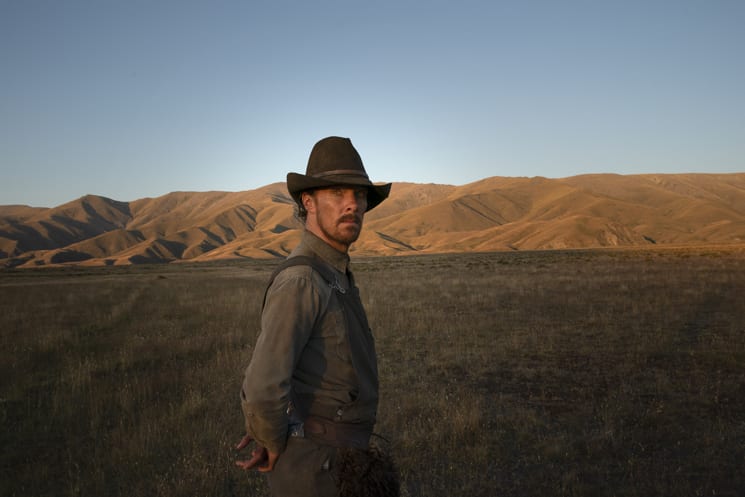After 12 years, Jane Campion is back at the narrative feature helm with The Power of the Dog, a striking balancing act of violence and beauty. Based on the 1967 Thomas Savage novel of the same name, dark longing disturbs the American West in a way that only Campion can.
The Burbank brothers Phil (Benedict Cumberbatch) and George (Jesse Plemons) are two polar opposites managing the family cattle ranch in 1925. Phil (rough, bitter and not afraid to get his hands dirty) and George (pragmatic, quiet and always in a suit) experience a growing schism when George marries sweet and simple widow Rose (Kirsten Dunst), who moves to the ranch with her sensitive, awkward son Peter (Kodi Smit-McPhee). A series of subtle cruelties having begun their introduction, and Phil takes an interest in tormenting Rose, haunting the ranch like the Grim Reaper and clearly triggered by her addition. Similarly, when Peter returns from his medical school studies, Phil's two-fold repulsion and interest in the young man are carefully revealed to be tied up in grief for his dead older mentor, and possible lover, Bronco Henry. Cumberbatch, who plays the role with such subversive eroticism and severity, is terrifyingly broken, and has my attention like never before.
Underlying the growing sexual and grave tensions is the surrounding landscape of Campion's native New Zealand, convincingly standing in for Montana and gorgeously captured by cinematographer Ari Wegner. Phil is keenly aware of — even possessed by — the mountains, often looking out and quietly challenging his fellow ranchers to see what he sees. The sublime nature of the land, its golden hours casting a ray of mythical grace and a shadow of uneasiness, is accented by Jonny Greenwood's dizzyingly understated score. Phil's rare moments of something-like-tranquility are reserved for the sacred spaces of private wood, body of water, or foliage, when he is left alone in his longing.
The threat of death is a daily reality here, with casual mentions of anthrax, the inherent brutality of the ranch, and the constant chest-puffing show of masculinity serving as reminders. The Power of the Dog treats people bluntly, like the animals they try to tame, themselves unknowingly domesticated by the the land on which they live. Sharp edits and time jumps tell us all we need to know: people die or get married, animals roam or are cut open, either out of sadism, curiosity, or necessity. No matter, these things are part of the same ecosystem. There is little room for sentimentality in the wild, and feeling makes you vulnerable and, at worst, can kill you.
Unrequited desires, deep resentments and hidden emotions are under the surface of every frame, palpable in imagery of the licking of a cigarette paper or the insertion of rawhide in the loop of a rope. Life and death, as well as sensuality and savagery, are symbiotic. But, in a twist, giving into a flawed human connection can also make you more alive: to have died is to have lived, finally freed of the weight of your secrets.
(Netflix)The Burbank brothers Phil (Benedict Cumberbatch) and George (Jesse Plemons) are two polar opposites managing the family cattle ranch in 1925. Phil (rough, bitter and not afraid to get his hands dirty) and George (pragmatic, quiet and always in a suit) experience a growing schism when George marries sweet and simple widow Rose (Kirsten Dunst), who moves to the ranch with her sensitive, awkward son Peter (Kodi Smit-McPhee). A series of subtle cruelties having begun their introduction, and Phil takes an interest in tormenting Rose, haunting the ranch like the Grim Reaper and clearly triggered by her addition. Similarly, when Peter returns from his medical school studies, Phil's two-fold repulsion and interest in the young man are carefully revealed to be tied up in grief for his dead older mentor, and possible lover, Bronco Henry. Cumberbatch, who plays the role with such subversive eroticism and severity, is terrifyingly broken, and has my attention like never before.
Underlying the growing sexual and grave tensions is the surrounding landscape of Campion's native New Zealand, convincingly standing in for Montana and gorgeously captured by cinematographer Ari Wegner. Phil is keenly aware of — even possessed by — the mountains, often looking out and quietly challenging his fellow ranchers to see what he sees. The sublime nature of the land, its golden hours casting a ray of mythical grace and a shadow of uneasiness, is accented by Jonny Greenwood's dizzyingly understated score. Phil's rare moments of something-like-tranquility are reserved for the sacred spaces of private wood, body of water, or foliage, when he is left alone in his longing.
The threat of death is a daily reality here, with casual mentions of anthrax, the inherent brutality of the ranch, and the constant chest-puffing show of masculinity serving as reminders. The Power of the Dog treats people bluntly, like the animals they try to tame, themselves unknowingly domesticated by the the land on which they live. Sharp edits and time jumps tell us all we need to know: people die or get married, animals roam or are cut open, either out of sadism, curiosity, or necessity. No matter, these things are part of the same ecosystem. There is little room for sentimentality in the wild, and feeling makes you vulnerable and, at worst, can kill you.
Unrequited desires, deep resentments and hidden emotions are under the surface of every frame, palpable in imagery of the licking of a cigarette paper or the insertion of rawhide in the loop of a rope. Life and death, as well as sensuality and savagery, are symbiotic. But, in a twist, giving into a flawed human connection can also make you more alive: to have died is to have lived, finally freed of the weight of your secrets.




